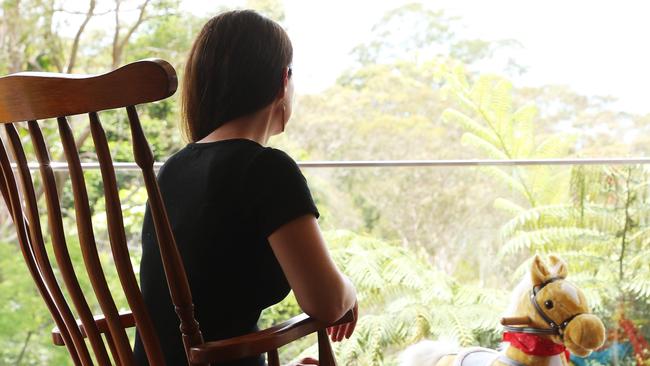Falling foul of the law: ‘abusive’ father takes girl overseas
A Sydney mother will spend Christmas without her daughter after she was forced to hand over the two-year-old into the care of the child’s allegedly abusive father, who immediately left the country.

A Sydney mother will spend Christmas without her daughter after she was forced to hand over the two-year-old into the care of the child’s allegedly abusive father, who immediately boarded a plane with the girl and left the country.
The little girl, Edith* was handed to her father on Thursday morning after her mother, Jane*, a First Nations woman, lost a two-year legal battle in the Family Court to keep her in Australia.
The court ruled against Jane despite a NSW magistrate last month making an interim apprehended domestic violence order against her former husband, preventing him from going within 100m of Edith and Jane’s home or workplace following serious allegations of domestic violence and abuse.
But on Friday afternoon, Edith flew out of Sydney with her father on a commercial flight, leaving Jane, her primary attachment, in despair.
Handing over her only daughter to a Family and Community Services case worker, heartbreaking video reveals Jane and Edith’s last few moments together.
“I’m sorry,” Edith says as mother and daughter cry. The two are in a locked room containing a few disorganised toys and a chalkboard. “Edith, I have to say goodbye,” Jane says.
“No, don’t take me,” Edith pleads to case workers through tears. “I want mummy.”
“I want you Edith,” Jane replies, as her daughter is handed into the arms of a support worker. “I’m so sorry,” Jane cries out, as her daughter is taken from the room.
The pregnancy
Jane met Edith’s father during an overseas trip in the mid-2010s and they began a long-distance relationship where they took turns to visit each other in their respective countries.
They eventually married and Jane fell pregnant.
However, not long after, she “started to notice changes” in her husband. She says the abuse began as psychological but later became physical.
“There were flags prior, but it was during pregnancy that I could see the psychological abuse and everything started escalating,” she said.
When she was seven months pregnant, Jane says she was coerced to travel overseas with her husband. She always intended that Edith would be born in Australia and was booked in to give birth at an Australian hospital. But she never expected that she wouldn’t be able to return.
“He just coerced me, he just broke me down until I gave in,” she said. “I told my mum I’d see her in a week or so. Once I got there it just escalated.
“It was just this beating down of my will. He was constantly telling me that I was a burden on those around me.
“Up until seven months of my pregnancy I was still working in Australia; I wasn’t actually a burden.
“I just remember it was a feeling of suffocation. I’m a really strong person ordinarily, and it was just a wearing down, he was trying to separate me from my friends and family.”
Jane says she couldn’t return to Australia, and alleges in court documents that when she expressed desire to return home her husband aggressively punched a pillow next to her head and threw a suitcase at her, narrowly missing her.
“I made the mistake of telling him I was coming back home (to Australia). I realised it was not safe and I realised it was getting bad. I just needed to be home and I should have just found a way to order a taxi or something like that.
“But I just told him that I was coming home and I told him about the tickets and that’s when he erupted. It was just terrifying.”
She also alleged in court documents her husband told her she was going to be “dropped off and raped by the Moroccans”.
“That caused huge contractions and by morning I was bleeding,” she said. Doctors told her she couldn’t fly home.
“He locked me in the attic and called me a flight risk,” she said.
Citizenship fight
Edith was born overseas after a 38-hour labour ended in a caesarian.
“I was happy to be alone, with him not in the room; there was a stint of seven hours I was just alone and that was more peaceful,” she said.
“I was longing to be home, longing for my mum, longing for my sisters.
“I’m an older mum, and it should have been a joyful time to finally have my only baby, and I knew that she would be my only one. I turn 40 next year and I’ve just had to give her away.”
After Edith’s birth in 2020, Jane was stuck in Europe. Delays caused by the pandemic meant she wasn’t able to secure citizenship for her daughter.
She says her husband told her “I know where I can bury you and get away with it”.
After finally being able to secure Australian citizenship for Edith and an emergency passport, mother and daughter flew home in 2020 at the height of the pandemic. But shortly after, her husband applied for Edith to be returned to his care under The Hague Convention on the Civil Aspects of International Child Abduction, on the grounds that she was born in Europe.
The Hague Convention was created in the 1980s to provide an avenue for children who had been taken abroad by one parent without the consent of the other to be expeditiously returned, but has since been described as a “good law gone bad” with 80 per cent of Hague cases made up of women trying to flee domestic violence with their children.
In most cases, a woman will return to her abusive partner rather than send her child back home alone. The primary intention of the convention is to preserve whatever child custody arrangement existed immediately before an alleged wrongful removal from the country of “habitual residence”.
After a two-year battle, the Family Court of Australia ruled The Hague Convention must be upheld and Edith returned to her father.
Legal amendments by the Labor government earlier this month mean women fleeing domestic violence situations will no longer be forced to return to their abusive partners – or to hand over their children.
Domestic violence will be taken into account when the treaty is invoked and survivors will be better protected by the justice system.
But the legislation is not retrospective.
The law rules
Edith boarded a flight at Sydney International Airport on Friday afternoon.
In a medical certificate dated this month, a doctor stated Edith should not fly unless given medical clearance due to ongoing medical issues, which The Weekend Australian has decided not to disclose for privacy reasons.
“This is a case where the best interests of the child, and the best interests of the First Nations child have been ignored,” Jane said.
“Why do we have a law in our country that instructs judges to ignore the best interests of the child?
“I’m left without my daughter and she’s crying for me. “She’s with a person who makes her anxious and scared and who has been abusive to her in the past and he has an ADVO and he’s not even meant to be near her residence and now their residence is together.
“It’s just unfathomable, it’s so negligent, and there’s so much research that says the breaking of the primary attachment between the ages of one and three will be catastrophic for her for the rest of her life, it will cause her to be detached and it will cause all these emotional problems.
“I know that I’ve poured a lot of love into her, and I know she’ll have some resilience, but to do this to a two-year-old child is just cruel.”
* Edith and Jane are pseudonyms required for legal reasons.



